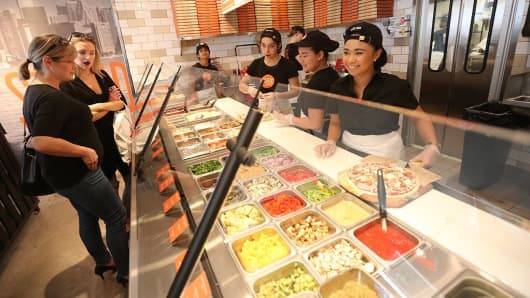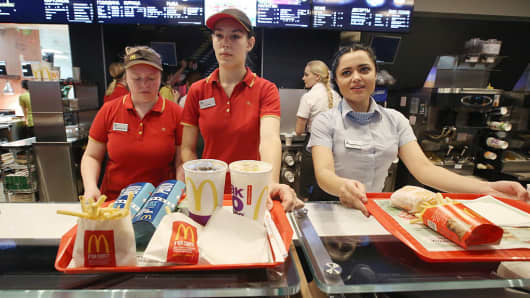Originally published on CNBC: It seems clothes and haircuts aren't the only things that go out of style. The year was filled with food trends that will start to simmer come 2017, including rainbow bagels, quinoa and sushi burritos.
But don't worry — there are some interesting food trends to keep you occupied in 2017. Here are six foods you'll likely be eating next year.
1. Poke
This Hawaiian specialty has cruised to the mainland and is quickly spreading across the U.S. Traditional poke, pronounced "po-kay," is cubed, fresh raw seafood (usually tuna or octopus) mixed with soy sauce, green onions and sesame oil and served over rice.
"You will start to see more around the poke trend," Darren Tristano, president of Technomic, told CNBC, explaining that the specialty food will migrate from fine dining restaurants to niche restaurants and onto menus across the country.
The National Restaurant Association named poke a hot trend for 2017 after surveying almost 1,300 professional chefs to determine menu trends for the coming year.
Authentic ethnic cuisine and sustainable seafood were also among the top 20 anticipated food trends, according to the survey. So, expect to see more variations of traditional poke appearing in restaurants across the country.
"Menu trends today are beginning to shift from ingredient-based items to concept-based ideas, mirroring how consumers tend to adapt their activities to their overall lifestyle philosophies, such as environmental sustainability and nutrition," Hudson Riehle, senior vice president of research for the National Restaurant Association, said in a statement.
2. Pizza
There's nothing cheesy about the pizza sector's success in 2016. Both delivery and fast casual chains have seen massive sales growth that is expected to continue next year.
Domino's saw revenue grow 16.9 percent in the third quarter versus the prior year, due in part to strong same-store sales growth. The company said domestic same-store sales rose 13 percent in the latest period, marking the 22nd consecutive quarter of positive U.S. growth.
On the other end of the spectrum, fast casual pizza "has been growing pretty rapidly," Mark Kalinowski, managing director of U.S. restaurant industry research for Nomura Instinet, told CNBC.
Technomic's Tristano notes that Blaze Pizza and MOD Pizza are two chains to look out for in 2017.
"In the United States pizza is the second-largest restaurant category," Scott Svenson, co-founder of MOD Pizza company, recently told CNBC. "And there is a lot of saturation, but we are doing it in a completely new way."
3. Chicken
A lot of the new items on restaurant menus will have something in common in 2017: chicken.
The top 250 restaurant chains added some 325 new chicken items during the 12 months ended June 30, according to research from Technomic. For comparison, only 73 new beef items were added in the same period.
Chicken's popularity is expected to grow in the New Year, reflecting consumer cravings for healthier, high-protein meat — not to mention a decade of high beef prices, which made chicken more appetizing for companies' bottom lines.
And since chicken can be healthy or indulgent, it can please a wide spectrum of diners, Kalinowski said.
Expect Chick-fil-A to continue its reign in the fast food sector as chains like Burger King jockey for position behind it. On the fast causal side, PDQ and Raising Cane's are restaurants to watch for menu innovations.
4. Value meals
The value wars will continue into 2017, as this year's popular "4 for $4" meals and "2 for $5" deals become more prevalent, Tristano said.
A highly saturated market has contributed to low prices, as restaurants compete for share. Many consumers have been opting to eat at home, as prices at the grocery store remain depressed.
Tristano cautioned, however, that prices eventually have to rise, so customers should expect to pay a bit more if they want to find quality meals.
5. Organic, antibiotic-free and hormone-free food
It's likely that Panera Bread won't be the only restaurant chain to adopt new practices for the welfare of its livestock raised for meat production.
The chain, which has been ahead of the curve on transparency about its products, reported earlier this month that it will adhere to standards set forth by the Global Animal Partnership's Broiler Chicken Standard.
The standard requires no cages or crates of crowding be used on farms, which is aimed at improving the living environment of the animals. Also, no physical alterations can be made to the bird, including beak trimming, de-spurring or toe trimming.
Organic, antibiotic-free and hormone-free foods "are subsets of a broader trend," Kalinowski said. "Consumers are educating themselves about what's going in their bodies and what's going into children's bodies."
Restaurants like McDonald's, Starbucks and Subway, among others, have begun to make changes to how they source their meat, eggs and other ingredients. This trend will continue into 2017.
6. Cold-brew coffee
Although not technically a food, cold-brew coffee will continue to reign at coffee shops and supermarkets alike. Cold brew is the process of steeping coffee grounds in room-temperature or cool water for 12 hours or longer, to extract a bolder flavor from the beans.
In 2015, cold-brewed coffee helped boost summer sales for many U.S. coffee shops. Peet's Coffee & Tea, one of the nation's biggest coffee chains, replaced traditional iced coffee with cold brew in June 2015. It saw cold brew sales exceed the previous year's iced coffee sales by as much as 70 percent.
Cold-brewed coffee can be found at chains like Starbucks and Dunkin' Donuts, but don't be surprised if other restaurants start picking up on the trend in 2017.
Cold brew accounts for almost $140 millionin the U.S. market alone.
Cold-brewed coffees are lining the shelves at supermarkets, as increasing numbers of consumers push for ready-to-drink beverages. Companies are following demand, and there doesn't seem to be any sings of slowing for the trend, which is all about flavor profiles and less about getting a caffeine fix.












































